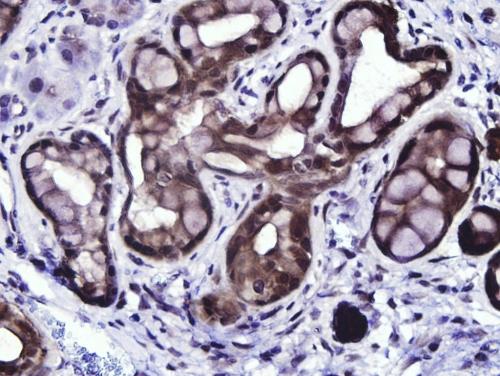
The work of faculty in nutritional biology at UC Davis bridges basic and applied nutrition research, and spans developmental nutrition, child nutrition, food intake regulation, and the role of diet in modulating an individual’s susceptibility to the development and progression of chronic disease.
The research of NUTGAP program director Gerardo G. Mackenzie focuses on the role of diet and other lifestyle factors in cancer development and prevention. Current projects include the following.
- Understanding the cellular and molecular mechanisms involved in the link between obesity, inflammation and cancer;
- Evaluating the role of zinc in pancreatic carcinogenesis; and
- Investigating the use of select nutraceuticals as potential chemopreventive agents.
Lauren Au and the students in her lab study the intersection of diet, nutrition policy, and obesity prevention, and the implications for health of individuals from low-income and racially diverse populations. She seeks to understand how to promote healthier eating and prevent obesity through the Special Supplemental Nutrition Program for Women, Infants, and Children and the National School Lunch Program. The overall goal of her research program is to provide evidence-based research to support strong nutrition policies and reduce disparities in low-income populations.
Brian Bennett explores genetic components of chronic metabolic diseases, such as cardiovascular disease and obesity, through integrative genetic studies. His research examines the relationship among genetic variants, gene expression levels, and metabolite levels, and how these interact to increase susceptibility to cardiovascular disease. His research also looks at the effects of specific dietary components on metabolic diseases, such as how diet affects gene expression.
Fawaz G. Haj‘s laboratory studies the molecular basis of metabolic diseases, mainly obesity and type 2 diabetes. The lab uses genetic, biochemical, proteomic and pharmacological approaches in various experimental platforms that include cells, rodent models of disease, and humans.
In his research, Peng Ji evaluates the risks and opportunities of nutritional factors in enhancing neurodevelopment and host resilience to early-life adverse events such as infection and stress. The lab uses neonatal pigs as a translational model becasue of broad resemblance between pigs and humans in digestive physiology, components of immune system, anatomic structure of brain and perinatal neurodevelopment. For example, a current project uses nursing pigs to investigate how unbalanced iron status in early life affects systemic and CNS iron homeostasis, susceptibility to infections, brain energy metabolism, and social cognition.

Mary Kable is interested in the mechanisms governing how diet impacts the bacterial composition of the human gut and how these diet-bacterial interactions can influence human health. In particular, she is interested in how dietary fiber can affect the composition of the gut microbiota in such a way as to increase or decrease colonization resistance and susceptibility to food borne pathogens.
Danielle G. Lemay‘s lab studies how dietary components, especially fermentable carbohydrates, affect host response and whether that response is modulated by the functional capabilities of resident microbiota. Her lab also applies big data techniques, such as sequencing technologies and machine learning, to understand the effects of diet on human health.
Patricia I. Oteiza‘s research has two foci.
- Characterizing the effects of trace mineral deficiencies and trace mineral toxicities on early developmental processes.
- Examining the putative health benefits of flavonoids.
Research in the Jon Ramsey lab focuses on nutrition as it relates to obesity and aging. The lab goal to understand the biochemical mechanisms contributing to aging and obesity, and develop dietary interventions to promote weight loss and healthy aging.
Carolyn M. Slupsky studies the impact of diet on human health from the perspective of nutrition, the gut microbiome, and host-microbial co-metabolism. She uses a multi-discplinary research approach that integrates metabolomics with clinical measures, global gene expression profiles, as well as microbial community analysis to understand the intimate link between our gut microbiome, metabolism, and health.
Francene Steinberg’s research focuses on the physiologic effects of bioactive food components to reduce risk factors for cardiovascular and obesity-related chronic diseases. She uses human trials and complementary research approaches to study metabolic markers of lipid and lipoprotein metabolism, endothelial function, inflammation and metabolic homeostasis; with a goal to examine nutritional phenotypes of individuals responding to intakes of food phytochemicals and characterize metabolic responses that promote health and chronic disease risk reduction.
Ameer Taha uses mass-spectrometry-based ‘omic’ methods to quantify oxidized lipids and lipid-like environmental toxins (such as pesticides and antibiotics) in the food supply, and to understand how they impact the brain. Ultimately, his research will provide information on the critical levels of exposure that could alter brain development or vulnerability to neurodegenerative processes.
Guangdong Zhang seeks to elucidate the molecular mechanisms for the health effects of dietary and/or environmental compounds, in order to better understand their metabolic individualities, address inter-individual susceptibilities, and clarify their health effects.
Angela M. Zivkovic’s examines the role of diet and nutrition in Precision Health. Precision Health emphasizes individually tailored approaches to optimize health and prevent disease. The Zivkovic Lab has four overall research themes.
- Investigating the functional biology of HDL;
- Assessing the effects of diets and dietary constituents on inflammation;
- Integrating clinical, metabolomic, proteomic, glycomic, transcriptomic, and genomic approaches to characterize metabolic phenotypes and their responsiveness to different diets; and
- Investigating the effects of diets and dietary constituents on the gut microbiota and how they in turn affect host health.
